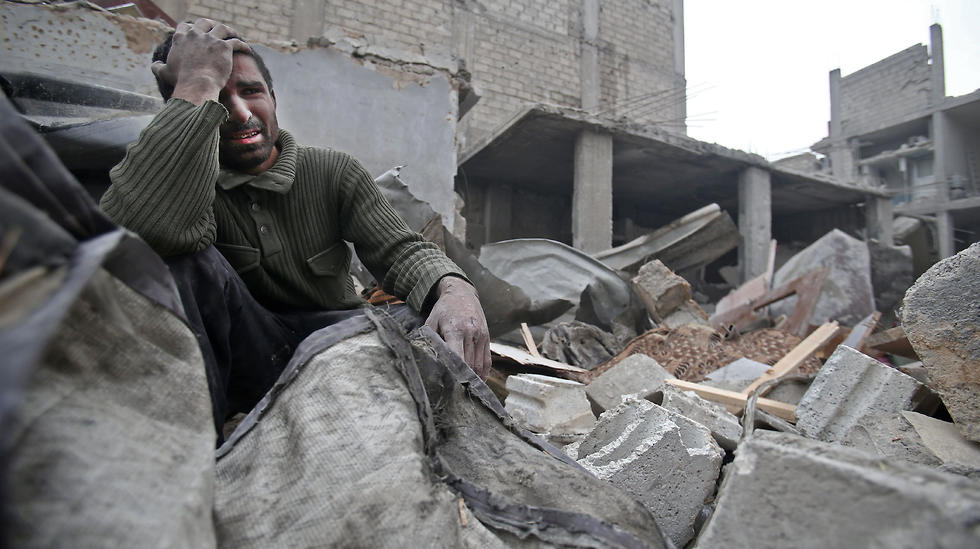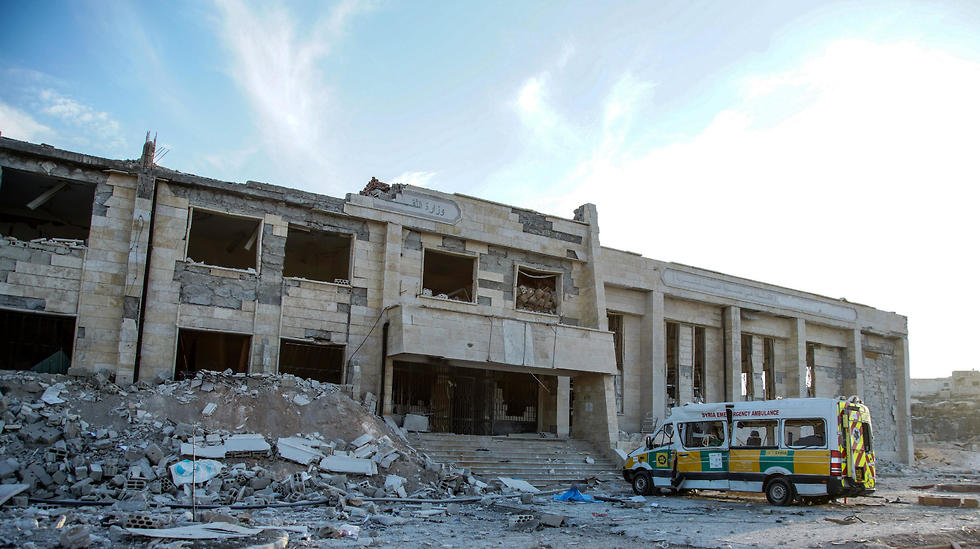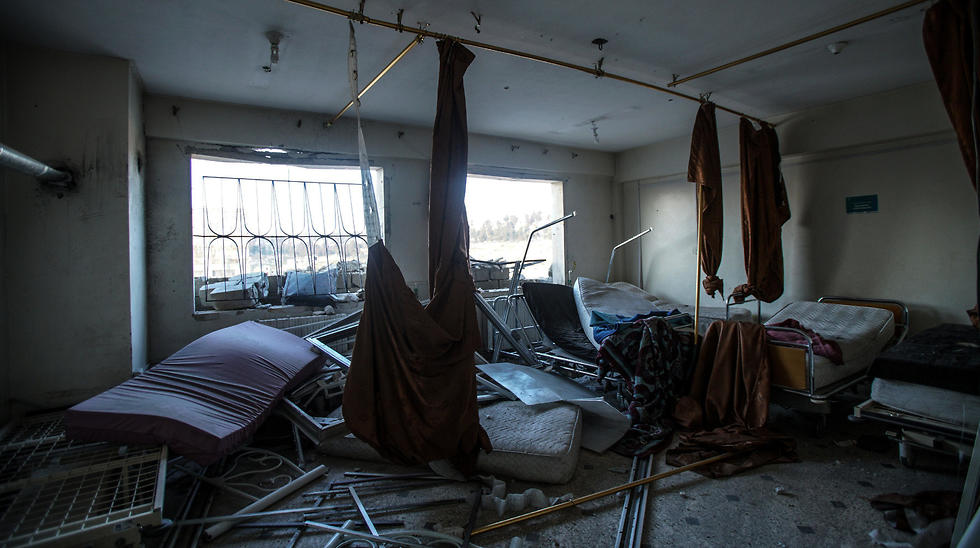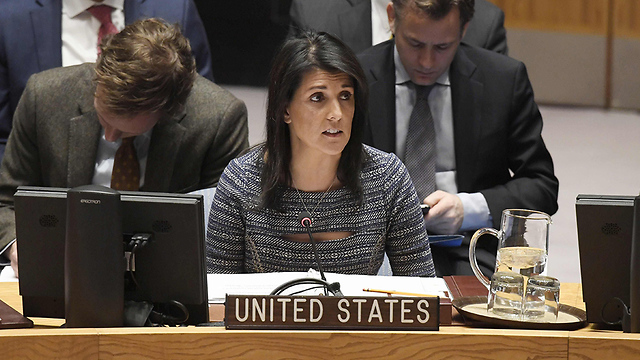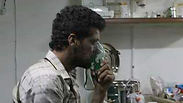
UN war crimes experts investigating reports of chlorine use in Syria
In Idlib, rescue workers report 11 people suffering from breathing problems from chemicals dropped from the air; three hospitals in area also hit in airstrike; Ghouta also hit by 'indiscriminate bombardment,' says head of International Commission of Inquiry on Syria.
UN war crimes experts said on Tuesday they were investigating multiple reports that bombs allegedly containing banned chlorine have been used against civilians in the Syrian towns of Saraqeb in Idlib and Douma in eastern Ghouta.
Sieges in the rebel-held Damascus enclave of eastern Ghouta "involve the international crimes of indiscriminate bombardment and deliberate starvation of the civilian population," Paulo Pinheiro, head of the International Commission of Inquiry on Syria, said in a statement issued in Geneva.
Reports of air strikes hitting at least three hospitals in the past 48 hours, "make a mockery of so-called 'de-escalation zones," he said.
The Britain-based Syrian Observatory for Human Rights monitoring group said warplanes attacking eastern Ghouta near Damascus had struck the towns of Zamalka, Arbaeen, Hazza and Beitu Soua, killing at least 29 people. State media said rebel fighters shelling the government-held capital killed a woman.
In Idlib, the other main battlefield in the war between Assad's government and its main rebel opponents, bombing also intensified on Sunday night after rebels shot down a Russian warplane on Saturday.
Rescue workers said at least nine people had suffered breathing problems from chemicals dropped from the air. Aid groups and rescuers said three hospitals had also been struck.
The Syrian American Medical Society (SAMS), a charity which supports hospitals in Syria, said its doctors in Idlib reported 11 patients "with symptoms indicative to usage of chlorine."
Two barrels containing chemical gasses had been dropped from helicopters on Sunday night, Radi Saad, from the chemical weapons team of the White Helmets civil defense group that operates in rebel-held parts of Syria, told Reuters.
The Syrian government has consistently denied using chlorine or other chemical weapons during Syria's conflict. Rescue workers and medical groups have accused government forces of using chlorine gas against the rebel-held eastern Ghouta at least three times over the last month, most recently on Thursday.
The German government called on Monday for a thorough investigation into reports Syria had used chemical weapons in both Idlib and eastern Ghouta.
"If it is confirmed that the Syrian government has once again used chemical weapons, that would be an abhorrent act and an egregious violation of the moral and legal obligation to avoid the use of chemical weapons," a German foreign ministry official said.
In Washington, the State Department said in a statement that the United States was "gravely alarmed" by reports the Syrian government has used chlorine gas in Idlib.
"The use of chemical weapons by all parties in Syria must unequivocally stop," it said.
US accuses Russia of protecting Syria
US Ambassador Nikki Haley on Monday accused Russia of protecting Syrian President Bashar Assad from responsibility for what she said were multiple chlorine gas attacks on civilians in recent weeks.
Haley told the UN Security Council that Russia has delayed adoption of a council statement condemning the use of chemical weapons, including a reported chlorine gas attack Thursday in the opposition-held Damascus suburb of eastern Ghouta that injured over 20 civilians including children.
Russian Ambassador Vassily Nebenzia retorted, "It's completely clear to us the goal is to basically accuse the Syrian government of chemical weapons use where no perpetrators have been identified."
Russia proposed a rival press statement eliminating references to Thursday's attack and to "the unacceptable level of violence in Syria, particularly in eastern Ghouta." He proposed adding language about a new investigative body to determine responsibility for chemical attacks that is unacceptable to the US and its allies.
The US and Russia have been lashing out at each other for months over the issue of accountability for chemical attacks in Syria, which is a close ally of Moscow.
A joint investigation team comprising experts from the UN and the Organization for the Prohibition of Chemical Weapons concluded that the Syrian government used chlorine gas in at least two attacks in 2014 and 2015 and used the nerve agent sarin in an aerial attack on Khan Sheikhoun last April 4 that killed about 100 people and affected about 200 others.
The team also accused the Islamic State extremist group of using mustard gas in 2015 and again in September 2016 in Um Hosh in Aleppo.
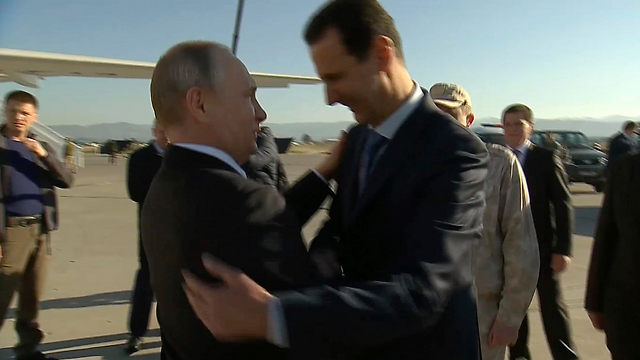
Russia accepted the accusation against the ISIS militants but rejected the experts' findings on the Syria government as unproven and demanded major changes in the way the expert team from the Joint Investigative Mechanism, or JIM, operates.
The US and about 10 other council members insisted that the JIM must remain independent, but Russia used its veto to prevent its mandate from being renewed.
The result is that there is currently no way to determine responsibility for chemical attacks in Syria.
Haley said the Assad regime must immediately stop using chemical weapons.
"Our goal must be to end the use of these evil, unjustifiable weapons," she said. "We cannot hope to end the use of chemical weapons if those who use them escape the consequences of their action."
Haley stressed that like the JIM, a new mechanism must be independent, impartial and be "controlled by experts, not politicians or diplomats."
She again rejected Moscow's proposed resolution to replace the JIM, saying it ignores the JIM's findings—"an investigation that Russia supported until the investigators found the Assad regime to be responsible."
Russia also wants "to cherry pick investigators" and give the Security Council power to review the findings and decide what goes into the final report, Haley said.
UN disarmament chief Izumi Nakamitsu told the council that the OPCW is continuing to follow up on the remaining "gaps, inconsistencies and discrepancies" in Syria's declaration to the chemical weapons watchdog about its chemical weapons program.
She said OPCW experts are also looking into allegations of chemical weapons use in opposition areas and in government areas, and reports are due soon.
If the OPCW fact-finding missions conclude that chemical weapons have been used, "our obligation to enact a meaningful response will be further intensified," Nakamitsu said.
"It is my hope, and the hope of the secretary-general that such a response will favor unity—not impunity," she said.










